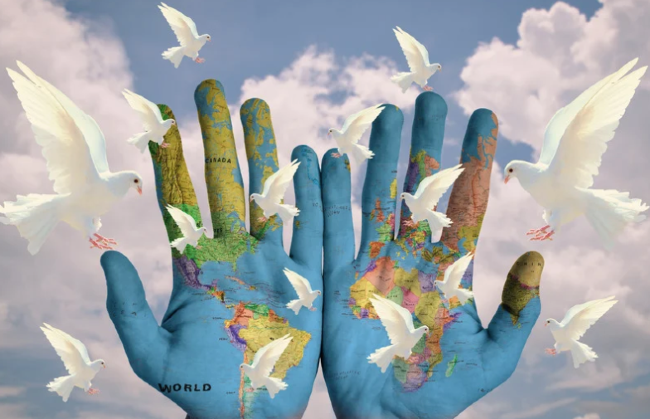Here is the sixth installment of our Exodus series. If you want to take a few minutes to read Exodus 13-15, click HERE. And if you missed the last column in this series, click HERE. Once again, we will walk through the text and highlight aspects that are not typically noticed, and then conclude with a few themes for ecological discipleship. Thoughts and comments are welcome. - James.
A Brief Overview
We've reached a decisive moment in the Exodus story. The Hebrews have left Egypt, but they are not yet free - one more confrontation awaits. But before we get there, God gives the people what appears to be a strange command; they are to consecrate every firstborn to God, whether animal or human. This is, primarily, to remind them that God took the life of every firstborn in Egypt, a terrible act that finally broke Pharaoh's oppressive grip and opened the door to freedom. God will do what it takes to counter anticreation forces that bring death and destruction upon the world and its creatures.
Consecrating the firstborn not only helps the people look back, however, it also serves as a continual reminder that God is the source of life - consecration is an act of gratitude, a recognition that life does not belong to us - it comes as a gift. It is important to note that Israel's firstborn children to be "redeemed"- no harm will come to them - and thus God's good purposes for Israel, and for creation, will continue. Christian readers will note the strong connections between this theme of Exodus and the death and resurrection of Jesus, God's "only begotten son."
The story then turns back to the action at hand - the people are pinned between the Red Sea and the desert, and the full force of Pharaoh's army is bearing down on them. Once again we see the stubbornness of evil! We also see, once again, the way God weaves creation and redemption together into a seamless act of salvation. The people have been led to this place by elements of creation - cloud and fire - that provide a physical home for the divine presence. Similarly, when the final act of deliverance comes to pass, it is through a profound divine/human/non-human partnership. Moses stretches out his hand, God brings about an east wind, and the waters recede - it is as a moment of harmony - God and creation working in concert - that makes the path through the sea possible. The event is in many ways a recapitulation of Genesis 1. The waters of chaos recede, revealing dry ground, which enables new life to begin. It is a moment of new creation.
As the Hebrews arrive safely on the other shore, the waters that parted for them close in on the Egyptian military, who are anything but in harmony with God, their fellow humans, and the non-human world. Old Testament scholar Terence Fretheim writes of this moment, "the Egyptians' anticreation activity turns the creation against them and they suffer at its hands."
This section ends with an extended poem of praise. A careful reading of the these "Songs of Moses and Miriam" reveals that this is not just a one-time victory confined to this particular time, place, or people. The final line - "The LORD reigns, for ever and ever" - reveals a cosmic aspect to this victory. Once again, Christian readers will see connections to the cosmic scope of Christ's death and resurrection (see esp. Colossians 1:15-20).
As they emerge from their journey through the sea, the people are reborn. But their journey has just begin - like all newborns, they will need to learn how to walk and talk and live in a new way. We will start to explore this in my next column - for now, let's reflect on a few themes that can inform our own journeys of ecological discipleship.

God is in Relationship With All Creation
We may think that God is only, or primarily, in relationship with human beings, but in the non-human world is constantly front and center, serving God and served by God. Yes, the elements of creation are frequently called upon to facilitate the liberation of human beings and the judgment of their oppressors, but this is, in part, because of Egypt's failure to embrace their vocation as co-caretakers of creation helping God bring the world to its full potential.
What does it mean today to see the non-human world around us as having a direct relationship to God? What does it mean to consider that our fellow creatures live more harmoniously with God and the world than we humans do? What can we learn from rocks, rabbits, and rhododendrons? Where do we see creation rising to address the current forces of "anticreation" in our midst? How might God be using the world to bring us to a place of repentance and/or deliverance - to restore us to our proper place within creation? Lots of big questions here - I'd love to hear your responses.

Salvation Is The Movement from Bondage to Bonding
The picture of salvation in Exodus is rich and complex. God's saving acts on behalf of the Hebrews free them personally, socially, economically, and politically. We could even say, with the promise of a home in a new land, they are saved ecologically. This is in line with biblical salvation, which is about comprehensive liberation.
But they are not just freed from all the forces of chaos and oppression that held them down, they are freed for service to God and creation. God does not liberate them so that they may pursue an unfettered life devoid of constraints, a life in which they can live any which way they choose. The Hebrews are freed from the oppressive and death-dealing rule of Pharoah so that they may live under the liberating and life-giving rule of Yahweh. This will require the development of a relationship - a process of bonding in which Israel and Yahweh come to know and love one another, and in which Israel learns how to be a blessing to the world in ways that serve God's larger purposes for creation.
This is the path that lies before them on the other side of the sea. It is also the path of every follower of Jesus.
With you on the Way,
James
Leave a comment below, or email me directly at james.amadon@circlewood.online.